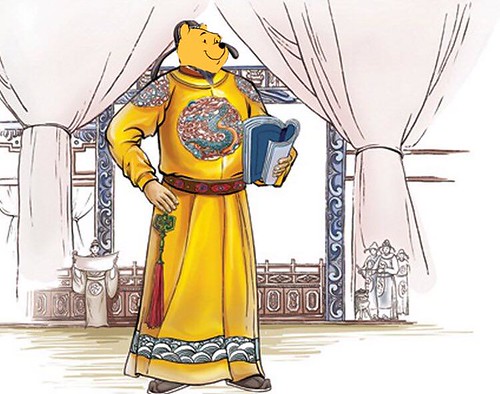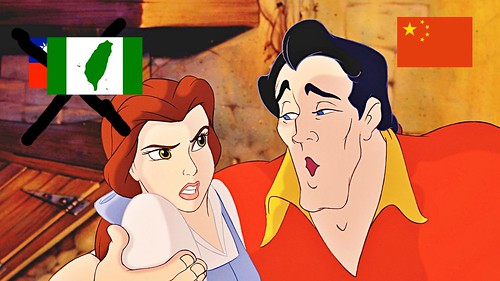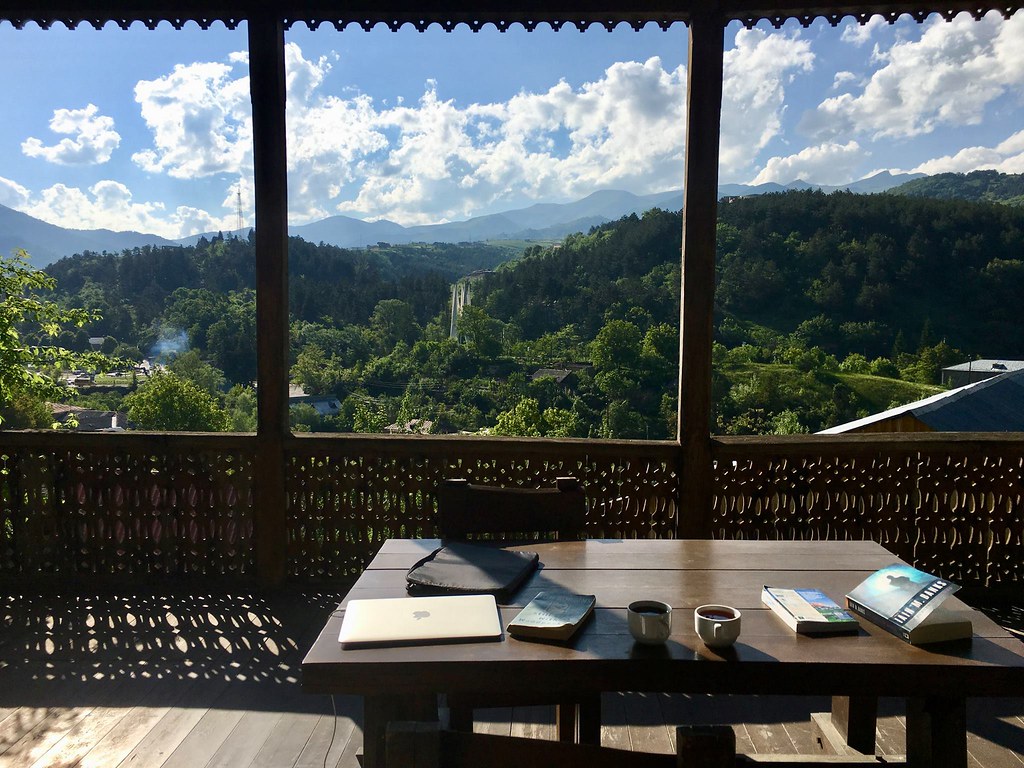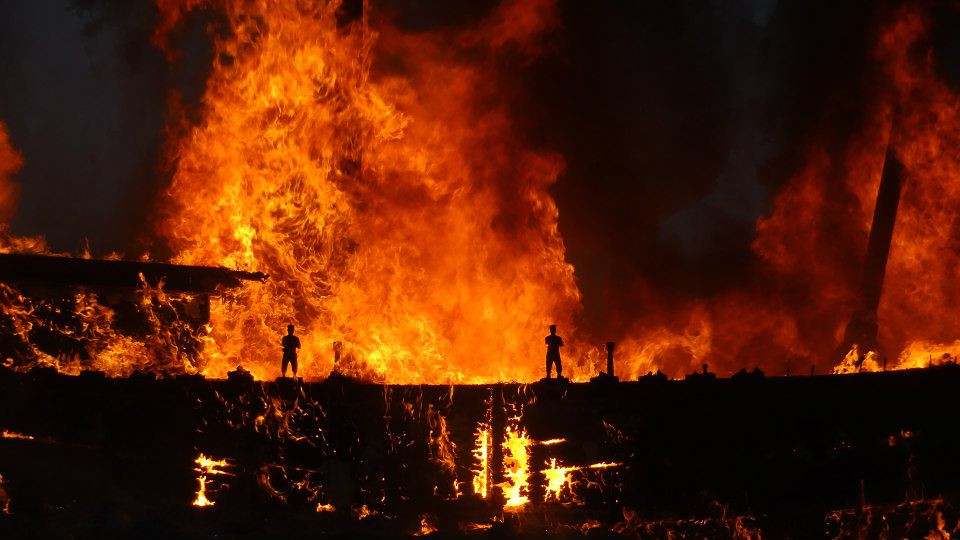 |
| Emperor Xi Jinping of the Pooh Dynasty |
Lots going on in the news this past week or two on China, its strategy abroad, the West's reaction to it, the rise of Emperor Xi, and what this could all mean for Taiwan.
I noticed, as international media outlets began reporting on Xi Jinping crowning himself Emperor Winnie of the Pooh Dynasty, that a number of them - most, in fact - curiously left out Taiwan, like the BBC, The Guardian, the Washington Post, the Wall Street Journal and the NPR News broadcast I listened to while making dinner yesterday. Only a brief mention of how he has "toughened China's stance" on Taiwan in this other Washington Post article (I can't read the New York Times coverage as I've used all my articles for the month and it's not one of the two papers I subscribe to). Even though that last one is about how Xi might use his throne - despite there being at least a fair chance, if not a likely one, that he will eventually use it to make a move on Taiwan - it doesn't factor in at all.
This is unsettling for anyone who cares about Taiwan - not just that this changes the game vis-a-vis a potential Chinese threat, but that the West doesn't seem terribly concerned about it. If you don't believe me about that threat, by the way, Donovan pointed out clearly why Taiwan is right to be terrified of Emperor Xi in The News Lens:
Most analysts (including myself) have thought the only way China would risk an invasion of Taiwan in the short to medium term would be if the China faced enough of an internal crisis that the power of the Chinese Communist Party was threatened, who would then use an invasion as a distraction and nationalist rallying cry....
This is where the terrifying part lies. Xi may consider actions purely for glory that his more institutional predecessors wouldn’t or couldn’t have.
This should make China’s neighbors very nervous. An absolute ruler of a massively powerful nation with ambitions to enter history is potentially very dangerous and unpredictable. China wants the Senkaku Islands from Japan, several border areas from India and to consolidate power over the South China Sea. But the obvious big prize to achieve glorious “reunification” of China and finally end the “century of humiliation” would be to take Taiwan.
That would be hugely risky and destructive course to take, potentially igniting a massive war involving many countries. But we can no longer assume that only a Chinese Communist Party facing an existential internal crisis is the only likely scenario whereby China would consider an attack.
Xi might just consider it for himself.
He is absolutely correct and I could not say it better myself.
I have no idea what Xi might do - there's a lot to consider. He wouldn't have made this power play if he hadn't been quite sure it could be accomplished fairly easily, meaning that there would be no need to 'distract' angry Chinese citizens by manufacturing a pretext to attack Taiwan. That said, China has underestimated resistance before (I genuinely believe they didn't see the Umbrella Movement coming, for example, and note how they only worked to send its leaders to jail once it became apparent they could actually get elected to LegCo in Hong Kong. I don't think they'd planned for that at all), and might be doing so now. I don't know. Within the CCP, there might still be a number of people who had thought, until this past Sunday, that they might be potential heirs to the Chinese presidency, and might be less than happy about this change in plan, but not necessarily saying so outright, given what Xi does to his rivals. That does mean, however, that it is not guaranteed that he is as surrounded by syncophants and True Believers as he might think he is, and there might be a crisis they truly don't see coming, for which they need to manufacture a distraction in the Taiwan Strait.
Yes, the CCP claims to value stability above all else - but what they claim and what they actually believe are not necessarily the same. They value what suits them, and nothing more (they're very Trumpian in this way, although perhaps less venal). They value "peace and stability" when it suits them, and are also quite willing to manufacture instability and crisis when that suits them instead (and keep that door open by continually rattling their saber at Taiwan). So I would not base a belief that Taiwan is basically safe on any CCP talk about "stability".
And yes, I do believe the CCP as a whole - as Donovan wrote so well - is as keen on actually taking Taiwan as they say they are. They want to keep up the claim, sure, but they know perfectly well we're more trouble than we're worth. Xi, though? I think he wants this just for him - for his historical legacy He's not doing this for the power. He could step down in 2023 and still have that. He's doing this because he wants to be a big name in the history books. Whether or not he actually believes his blah-blah-blah about the Chinese Dream, the Rejuvenation of the Great Chinese Nation, Reunification of the Motherland and Xi Jinping Thought (barf, barf, barf and barf, by the way) - that I don't know. But that's the kind of stuff that makes it into textbooks, not the more tepid reigns of people like Hu Jintao.
Sure, this takes off the pressure of him accomplishing "Reunification of the Motherland" (BARF) by the original end of his term, but it also means we have a president-for-life who is an ideological hardliner, especially on Taiwan.
So, we have every reason to believe he plans to make a move on Taiwan in his lifetime.
And this is terrifying. For Taiwan, and also for the world.
All of this "Rejuvenation of the Chinese Nation" (which includes annexing Taiwan) talk stems from China's "century of humiliation" victimhood mentality - they talk about it as though it's an internal confidence-building and great-nation-building exercise, but it's really about vengeance for being the one-time top dog who was laid low by the (admittedly crappy and colonialist) ascendant Western powers. They don't just want to be "a confident nation at ease with itself", they want to be on top again. They want global hegemony. They want to take the US's place.
Taiwan? We'll just be the first domino to fall. We've seen this coming for awhile - because China already claims us, they'll go for us first. In this scenario, Taiwan's beautiful, imperfect but vibrant and fierce democracy will fall. Assuming the country is not completely pulverized, for awhile, a sham democracy will take its place in which we are able to choose among "candidates" pre-selected by China in "elections". Eventually that might be scrapped too. Not immediately - the attrition must be slow, similar to their strategy in Hong Kong. This not only wears down resistance but also makes it easier for Western nations to pretend they don't see it happening. After all, they grow tired of most stories in the news after awhile. They might be mad at first, but nobody will want to upset the new global economic order - that could mean instability (oh no!) - so they won't actually do anything. And after awhile they'll forget that they were mad at all.
The world will have 23.5 million fewer free people, 23.5 million fewer people who lack basic human rights...and the rest of the world will hardly notice.
The US - well, our superpower status has kind of sucked. We're not great. A lot of Westerners angry at the abuse of our position as we supported the toppling of governments we didn't like and propped up regimes friendly to us, regardless of what was best for the countries involved, at our failed attempts at "spreading democracy" one bombing at a time, and our take on the global economy that reeks of modern mercantilism would be happy to see us fall and to see a non-Western (and non-white, because they're sick of white people taking the whole pie, as they have every right to be) power take our place. Triumph of the people of color, that sort of thing. The rise of the oppressed, toppling the oppressors.
It all sounds really wonderful if you blur your eyes. But, if you think about it, China is just an Asian version of Killmonger in Black Panther - his idea to funnel resources to the oppressed to they can overthrow the oppressors sounds great on its face ("it's a good idea!", some people said), but in the end he just wanted to institute another kind of oppression, a different sort of hegemonic rule.
But, it's easy to get people on board when the new bully in town isn't white. It looks a lot like liberation. It's not.
So why isn't the rest of the world worried yet? When (almost) every piece of news from Taiwan includes a reference to China no matter how unrelated, how is it that when something China does really is a threat to Taiwan, nobody seems to even realize it?
Brian over at New Bloom says this is because Westerners lack a conceptual framework in which to consider Chinese neo-colonialism (phrasing from Michael Turton) and he has a point - Westerners don't seem to have the necessary lexicon to really talk about China's global ambitions. They sure get tongue-tied if they try!
But, I don't think that's because they "lack the vocabulary" or even a "conceptual framework". The framework and vocabulary exist - neo-colonialism. Expansionism. Neo-imperialism (or, in the case of Taiwan, just 'imperialism'). Hegemony. Global domination. Economic subjugation. Checkbook diplomacy. Economic imperialism. The spread of authoritarianism. We have all of these words and frameworks.
It's just that Westerners are afraid of using them to describe China (or really any non-Western/non-white nation) for fear of seeming - or being labeled - racist. They're afraid someone will say they don't understand how the historic injustice of white privilege means that anything non-white people do can't be considered the same, or as bad, as anything white people do. (A worldview which has its uses, and which I am often sympathetic to, but which doesn't apply here.)
That's really all it is - it's a race thing. All they need to do is take their old frameworks, dust 'em off and apply 'em to a regime that happens to be Asian. There's nothing new or uncharted about it. Just stop being afraid of criticizing China because someone might think you're racist if you criticize shitty things non-Western powers do, and call China's actions what they are using words you already have.
What I'm saying is, the thing Westerners lack isn't vocabulary or conceptualization, it's balls.
Feeding into my idea that this is actually a race thing: the Western world seems content to ignore China's increasing reach - including its attempts at controlling or even abducting foreign citizens - when its levers of control are used to oppress other Asians (not just Chinese - this affects Taiwanese too, and the majority of Taiwanese identify as Taiwanese, not Chinese). Their increasing control over Australian citizens is ignored by the rest of the world - though kudos to the Sydney Morning Herald for continuing to report on the story - because most Australians affected have Chinese ancestry (but, remember, are not Chinese citizens). The world ignores Lee Ming-che - a Taiwanese citizen - because he looks Chinese. They ignore Gui Minhai - a Swedish citizen - because he looks Chinese. They ignore Hong Kong because they are Chinese, regardless of what Hong Kongers want or feel they were promised.
Yes, reports are filed, articles occasionally appear, but most of the West just doesn't care much. I suppose it's too bad that these problems are happening, they might think, but deep down, they don't think too much about it, because the victims don't look Western, and it's easy to ignore a bunch of Asians. Just an internal matter. It sucks, but, well, that's in China. No matter how much the people being threatened, persecuted and prosecuted might align themselves ideologically more with Western thought than "Xi Jinping Thought", and no matter how much it is not just in China - it's happening in their own countries - and not just Chinese citizens. That they look Chinese seems to be enough to get the West to turn the other way.
So what does this have to do with Emperor Xi, Taiwan and the coal mine?
Well, we are the bellwether. The new Emperor has his eyes on Taiwan. Don't think Taiwan is in that much trouble? I do. I don't see a good outcome here - either there's a massive crisis in China, in which case we're invaded as a distraction as the CCP tries to hold onto power. Or there's no crisis in China, and the slow march of their invasion plans continues forward without much resistance from the rest of the world (although I am heartened to see a little pushback). Or, there's a massive world war because Trumpo was bored with porn stars and Big Macs and couldn't keep his finger off the trigger, and China takes advantage of the chaos. No matter how this shakes out, good potential outcomes for Taiwan are few, and the possibilities leading to catastrophe are massive.
And what happens in Taiwan - perhaps an invasion, perhaps the slow erosion of our democracy under Chinese pressure, perhaps we get pulverized by missiles and then pushed into a sham 'democracy' where 'candidates' selected by China run for 'election', perhaps we spiral into economic ruin - is a sign of things to come under Chinese global hegemony over the rest of the world. Not in terms of outright invasion (of countries other than Taiwan), but in terms of the ways in which China will seek to influence what happens within those countries - who gets elected and what they do in office. Putting pressure on foreign governments to bring their own citizens in line regarding what they can and can't say vis-a-vis China (and perhaps anything else the Chinese government doesn't want us discussing, as well), through diplomatic and economic influence. If that doesn't work, threatening them directly.
In other words, to dust off some old vocabulary that we absolutely have, we'll all be tributary states.
Don't think China would care to reach that far into the affairs of other countries? They're already doing it, to citizens of those countries. Australia (and to some extent New Zealand) seem almost like test cases for how they'd do this - want to know what they'd like to do in the US and Europe? Watch Australia.
You just haven't noticed, because your fellow citizens being threatened by China don't look like you. Taiwan is getting the brunt of China's wrath, but they're already branching out, and there's a point at which they'll no longer care if criticism comes from someone who looks Chinese or someone who doesn't.
By then, you might care, but it will be too late. The canary is suffocating, and the time to pay attention is now.







